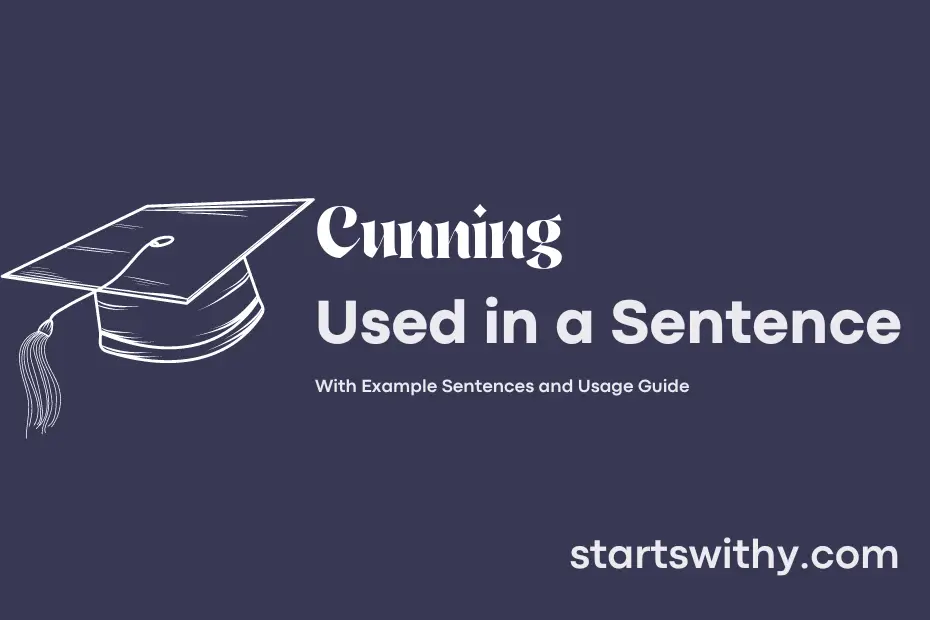Ever encountered a cunning individual whose cleverness left you in awe? Cunning is a trait that reflects the ability to achieve one’s goals through skillful manipulation and deception. It is a quality that often involves a shrewd understanding of situations and an adeptness at navigating them for personal gain.
Individuals who possess cunning are often able to outwit others through their quick thinking and resourcefulness. This trait can be utilized for both positive and negative purposes, depending on the intentions of the individual.
7 Examples Of Cunning Used In a Sentence For Kids
- The cunning fox tried to outsmart the other animals in the forest.
- The cunning monkey knew how to get the bananas from the tree.
- The cunning squirrel hid its nuts in a secret spot.
- The cunning cat quietly stalked the bird in the garden.
- The cunning crow tricked the rabbit with its clever plan.
- The cunning snake slithered through the grass unnoticed.
- The cunning spider spun a web to catch its prey.
14 Sentences with Cunning Examples
- Some students use cunning tactics to outsmart their peers in group projects.
- Instead of studying, he relied on his cunning strategies to pass exams.
- The college competition turned into a cunning battle of wits between the participants.
- She displayed her cunning side during the debate competition, catching her opponents off guard.
- The cunning student found a loophole in the assignment guidelines to get ahead.
- His cunning plan to impress the professors paid off during the presentation.
- Avoid falling into the trap of cunning schemes when preparing for exams.
- The club elections turned into a cunning game of political strategies among the candidates.
- She used her cunning charm to persuade the professors to extend the deadline for the project.
- Some students resort to cunning ways to secure top positions in campus recruitment drives.
- The cunning sales tactics of the book vendors attracted many students during the college fair.
- Be cautious of classmates who may try to use cunning methods to copy your assignments.
- His cunning demeanor during the internship interview impressed the recruiters.
- Instead of engaging in cunning shortcuts, focus on building a strong academic foundation for success.
How To Use Cunning in Sentences?
When Cunning is used in a sentence, it typically means being clever or subtly deceptive in order to achieve a desired outcome. Here is a simple guide on how to use Cunning in your sentences:
-
Choose the right context: Cunning is often used in a negative context to describe someone who uses intelligence and deception for their own benefit. Make sure the sentence you’re constructing fits this definition.
-
Placement of the word: Typically, Cunning is placed before a noun to describe a person or action. For example, “The cunning fox outsmarted the hunters.”
-
Use adverbs: To enhance the effect of Cunning, consider using adverbs like “very” or “extremely” before it. For example, “She was very cunning in her tactics.”
-
Provide context: It’s helpful to provide some context or background information in your sentence to make it more clear and engaging. For instance, “Despite his cunning ways, he eventually got caught.”
-
Practice makes perfect: The best way to get comfortable using Cunning in a sentence is to practice. Try incorporating it into your daily conversations or writing exercises.
Remember, Cunning is a powerful word that conveys a sense of intelligence and craftiness, so use it thoughtfully and in the right context to make your sentences more impactful.
Conclusion
In summary, the art of crafting sentences with cunning involves skillfully manipulating language to achieve a desired effect or outcome. Through clever wordplay, subtle hints, or sly insinuations, these sentences can convey a deeper meaning or create a sense of mystery. By carefully selecting words and arranging them in a strategic manner, writers can evoke curiosity, suspense, or even deception in their audience.
Whether used in literature, advertising, or everyday communication, sentences with cunning have the power to engage and captivate readers. They challenge us to think critically, decode hidden meanings, and appreciate the nuances of language. Ultimately, mastering the use of cunning sentences can enhance the impact of writing, leaving a lasting impression on those who encounter them.



